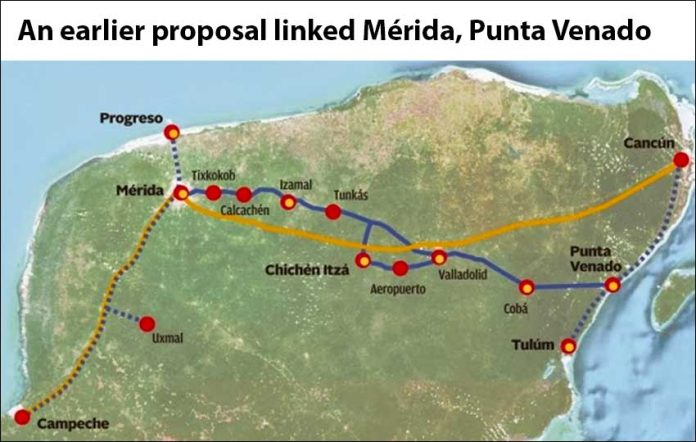President-elect Andrés Manuel López Obrador’s proposed Cancún-Palenque tourist train project has generated a positive reaction from business groups but received a more circumspect response from an environmental organization.
A Quintana Roo-based newly-elected senator for the López Obrador-led Morena party announced Saturday that the project would begin next year and that construction would take six years.
There were reports that the 830-kilometer railway would cost 100 billion pesos (US $5.2 billion) but the incoming government’s National Project 2018-2024 document puts the total investment needed at a more modest 64.9 billion pesos (US $3.38 billion).
The project is slated to be completed in four stages and will require cooperation between the federal government, private companies and communal landowners known as ejidatarios. It is intended to boost tourism and the economy in the south of Mexico.
The first stage would be a double track between Cancún and Tulum with six stations on the route and the second a single track between Tulum and Bacalar, with two additional stations. The third and fourth stages would also be single track and connect Bacalar and Escárcega, with two intermediate stations, and Escárcega and Palenque with another two stations.
Horacio Maya Terán, a vice-president of the Mexican Chamber of the Construction Industry in Quintana Roo, said that an infrastructure project of such magnitude must be welcomed because in addition to the benefits its construction brings, it will have a positive spillover on other parts of the economy.
Miguel Ángel Lemus, vice-president of the Caribbean branch of the Business Coordinating Council (CCE), said the construction of the railway will make investment in the region between Cancún and Tulum even more attractive than it already is and trigger other projects in surrounding areas.
However, the head of the environmental organization Yax Cuxtal looked beyond the project’s predicted economic benefits.
Aniceto Caamal Cocom said land would have to be expropriated and rights of way would have to be obtained, both of which would have an impact on communities on the Yucatán Peninsula.
He said that Yax Cuxtal will ask the incoming federal administration to provide all the relevant information about the project to the communities that will be affected.
The National Project document says there must be a strategy for the acquisition and integration of land and that among the project’s aims will be to “avoid negative impacts that could arise from a lack of planning.”
Roberto Cintrón, president of the Association of Hotels of Cancún and Puerto Morelos, said that once the new government takes office it must provide greater detail about where the funding for the project is coming from and the ways in which the private sector will be able to participate.
A transpeninsular train project was one of the infrastructure projects planned by the current federal administration, but was postponed by budget constraints. Its first phase would have connected Mérida with Punta Venado, Quintana Roo, between Tulum and Cancún.
Source: El Economista (sp)
